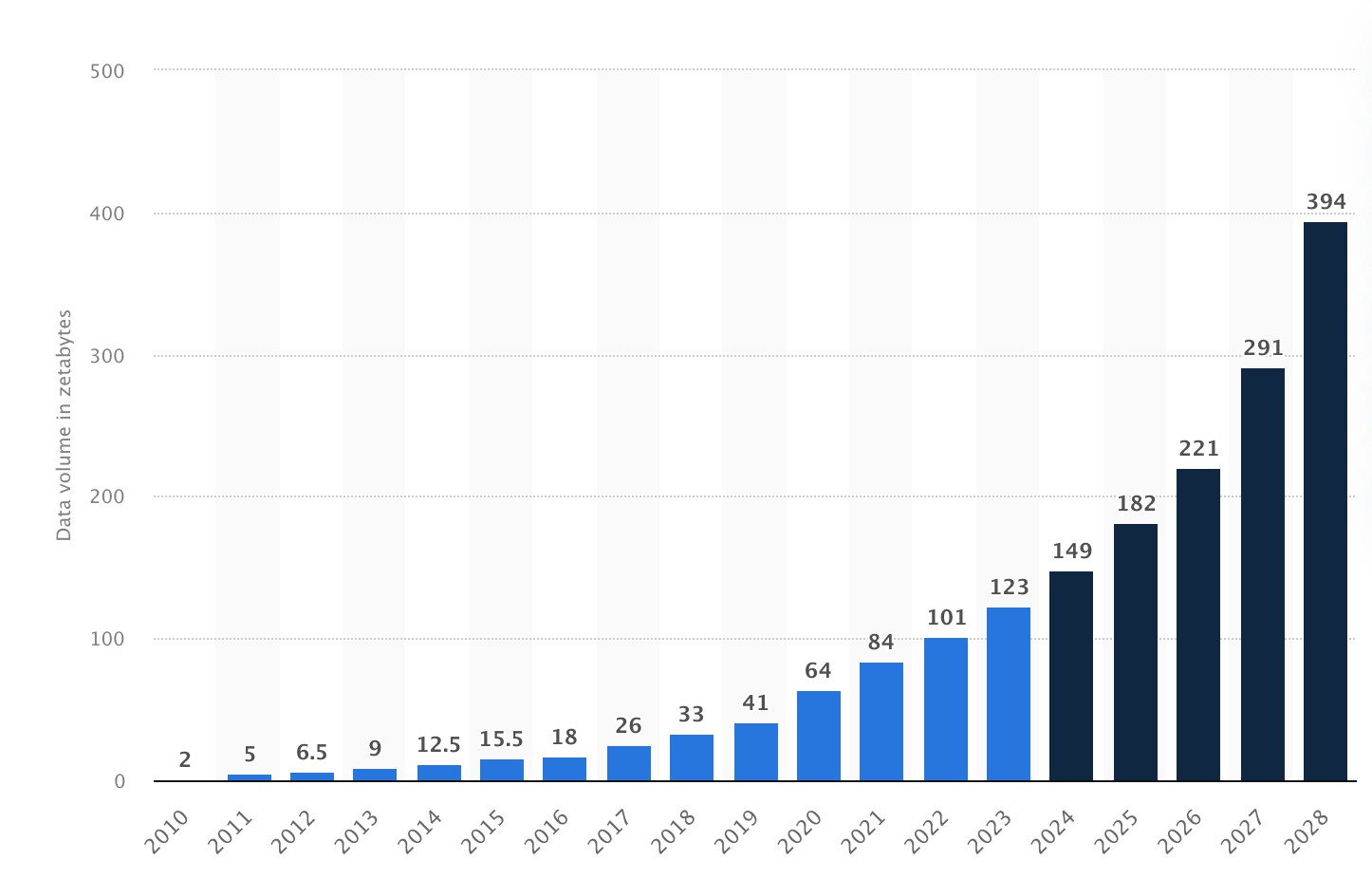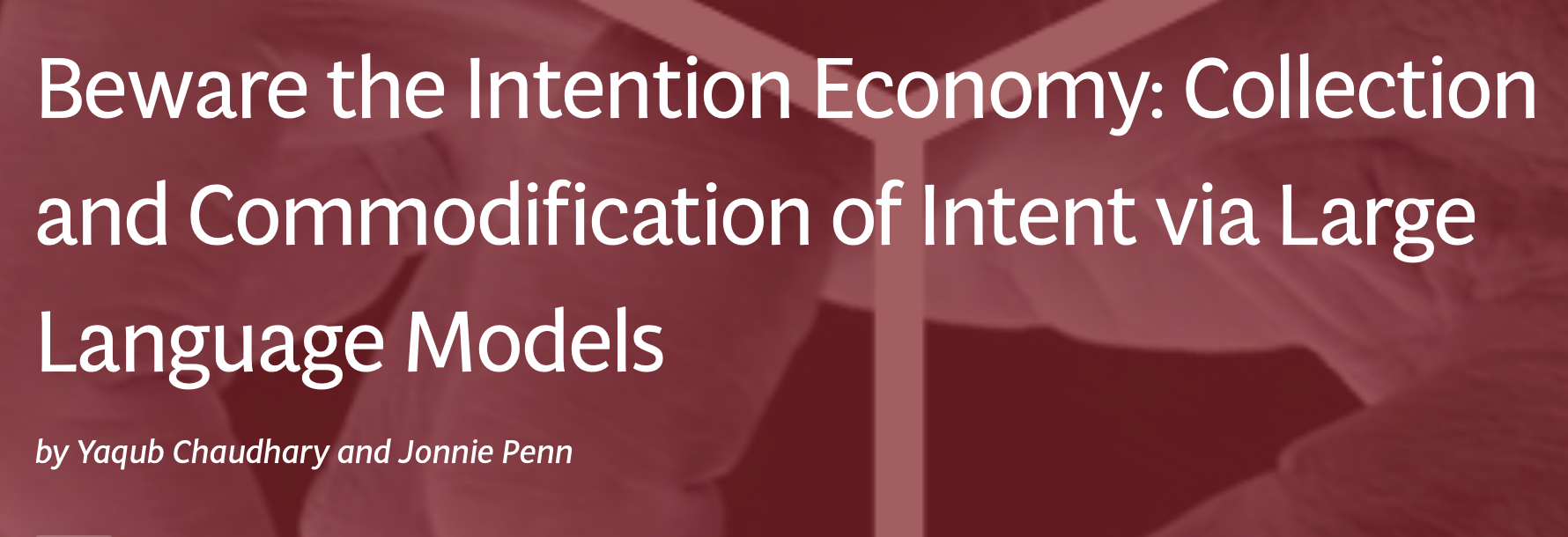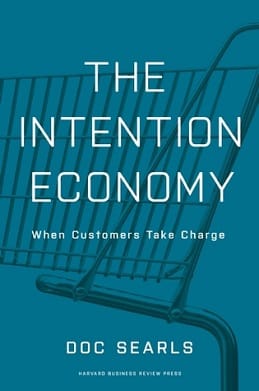Big ideas for 2025: The Intention Economy
Preparing for a future in which machines watch our every move - then sell predictions about our future behaviour to the data-industrial complex.

Humans are predictable. Understand what we've done in the past and you'll have a pretty good idea of how we'll behave in the future.
We're also easy to manipulate. Just observe the zealots who've lost their minds to a cult, cause or political movement.
Now machines are poised to take advantage of these twin vulnerabilities in the human psyche to create a potentially vast new market called the Intention Economy.
Large language models (LLMs) are already learning to influence our behaviour and gathering the data which will allow them to predict it. Soon, experts warn, they will be selling details of our likely future intentions to companies working in the growing data-industrial complex.
This troubling concept is no sci-fi nightmare. Tech giants ranging from Meta to Apple have already expressed an interest in the Intention Economy. Its arrival seems inevitable. In 2025, we have a chance to make sure the right laws and regulations are in place to deliver the undoubted benefits of technology that can predict the future - whilst protecting against potential pitfalls.
Drowning in data

Thanks to shrinking sensors and the mass adoption of mobile devices, more data is being gathered than ever before from an unprecedentedly wide range of sources.
Concurrently, the dawn of large language models (LLMs) has given us the ability to understand this data, spot trends and make reliable forecasts of a person's intentions.
The convergence of these trends lies at the heart of the Intention Economy.
On the penultimate day of 2024, The University of Cambridge released a warning from AI ethicists at its Leverhulme Centre for the Future of Intelligence (LCFI).
Researchers predicted that Conversational AI agents could learn to "covertly influence" consumers and sell forecasts about their behaviour to create a “lucrative yet troubling new marketplace for digital signals of intent”.
“Tremendous resources are being expended to position AI assistants in every area of life, which should raise the question of whose interests and purposes these so-called assistants are designed to serve”, said LCFI Visiting Scholar Dr Yaqub Chaudhary.
“What people say when conversing, how they say it, and the type of inferences that can be made in real-time as a result, are far more intimate than just records of online interactions.
“We caution that AI tools are already being developed to elicit, infer, collect, record, understand, forecast, and ultimately manipulate and commodify human plans and purposes.”
Evolution of the attention economy
In a paper, the team described the Intention Economy as "the attention economy plotted in time". This involves profiling "the arc of users’ attention" and how it "changes, calcifies, and connects to archetypal patterns of behaviour".
“While some intentions are fleeting, classifying and targeting the intentions that persist will be extremely profitable for advertisers,” Chaudhary added.
In other words: if you work out which habits a person is stuck with, you know what to sell them in future.
Whilst the attention economy focuses on snaring someone and keeping them where you need them to be for as long as possible, the intention economy needs to gather data and use that information to produce forecasts. It's a whole other level of invasive when compared to traditional advertising.
Dr Jonnie Penn, a historian of technology from Cambridge’s LCFI, said: “For decades, attention has been the currency of the internet. Sharing your attention with social media platforms such as Facebook and Instagram drove the online economy.”
“Unless regulated, the intention economy will treat your motivations as the new currency. It will be a gold rush for those who target, steer, and sell human intentions.”
“We should start to consider the likely impact such a marketplace would have on human aspirations, including free and fair elections, a free press, and fair market competition, before we become victims of its unintended consequences.”
How mature is the Intention Economy?

The Cambridge team said the buying and selling of intentions is currently an "aspiration" for the tech industry, but identified track early signs of this trend.
These include an open call from OpenAI for "data that expresses human intention across any language, topic, and format". The director of product at Shopify - an OpenAI partner - also reportedly discussed chatbots working “to explicitly get the user’s intent” at a conference the same year.
Nvidia’s CEO has "spoken publicly of using LLMs to figure out intention and desire, while in 2021 Meta released ‘Intentonomy’ research, a dataset for human intent understanding.
In 2024, Apple’s new ‘App Intents’ developer framework for connecting apps to Siri included protocols to “predict actions someone might take in future”.
In the future, chatbots will become full AI agents capable of deep, sophisticated manipulation and persuasion.
“AI agents such as Meta’s CICERO are said to achieve human-level play in the game Diplomacy, which is dependent on inferring and predicting intent and using persuasive dialogue to advance one’s position,” said Chaudhary.
“These companies already sell our attention. To get the commercial edge, the logical next step is to use the technology they are clearly developing to forecast our intentions, and sell our desires before we have even fully comprehended what they are.”
Good intentions: The optimistic roots of a dystopian technology

It wasn't always like this. Doc Searls first coined the term Intention Economy in an article for Linux Journal, describing it as a market in which "the buyer notifies the market of the intent to buy, and sellers compete for the buyer's purchase". An example could be someone taking a skiing holiday. They let businesses in the local market know about their visit, whereupon the companies compete for their custom.
"The Intention Economy grows around buyers, not sellers," Searls wrote. "It leverages the simple fact that buyers are the first source of money, and that they come ready-made. You don't need advertising to make them."
To ensure the best possible outcomes, these initial visions of the Intention Economy must be remembered as we move into the unsettling world of LLMs spying, manipulating and selling forecasts about behaviour, argued StJohn Deakins, founder of DataSapien.
He said: "Not all interpretations of the “intention economy” are dystopian. Doc Searls introduced the term in his book of the same name, describing a consumer-centric model where individuals proactively signal their intentions, and businesses respond transparently. In this model, technology acts as a bridge between informed consumers and ethical providers, fostering trust and mutual benefit.
"Searls’ version aligns with the principles of collaboration, respect, and agency. It envisions a marketplace that works for consumers, not against them. The challenge today is ensuring that the new AI-driven economy doesn’t stray too far from these ideals."
Deakins called for urgent action to address the risk of the intention economy. Part of this mission lies in enabling consumers to generate private, personal and anonymous intent signals, which can be shared optionally and securely to create "a more participatory" relationship between consumers and the companies that are after their money.
"The stakes are exceptionally high," he warned. "Without proactive measures, the Intention Economy could shift from being about serving consumers to steering them. Instead of empowering individuals, it risks creating an environment where brands and platforms wield disproportionate influence, treating human motivations as mere commodities."
Discover how zero share data could help to answer big privacy questions in 2025 by reading our full interview with StJohn Deakins.
We're looking for experts to talk about the concepts that will be important over the next year. Get in touch to let us know if you've got a big idea that needs to be talked about.




